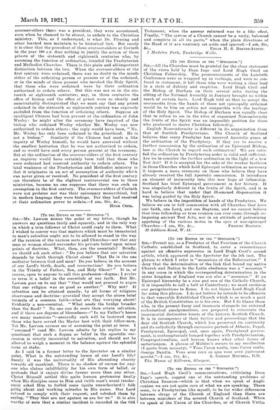(To THE EDITOR or THE " SPECTATOR.") SIR,—Permit me, as
a Presbyter of that Province of the Church Catholic established in Scotland, to enter a remonstrance against an offensive expression in Lord Hugh Cecil's second article, which appeared in the Spectator for the 5th inst. The phrase to which I refer is "secessions of the Reformation." I deny that the determination of the link that bound my native Church and Nation to the Latin obedience was a " secession " in any sense in which the corresponding determination in the sister kingdom of England was not also a " secession." If an Episcopal hierarchy be a sine qua non of the Catholic Church, it is impossible to call a halt at Canterbury; we must continue our peregrinations to Rome. I do not blame Lord Hugh Cecil for using this phrase. I do not believe he intends to be offensive to that venerable Established Church which is as much a part of the British Constitution as is his own. But I do blame those who, in the present fussy and insensate stampede for external ecclesiastical amalgamations, are prepared to eviscerate the immemorial distinctive tenets of the historic Scottish Church. It is in consequence of their tactics and proceedings that the dear old Scottish Church, which has preserved its continuity and its catholicity through successive periods of Abbatic, Papal, Presbyteral, Episcopal, and, once again, Presbyteral govern- ment, is contemptuously lumped together with Presbyterianism, Congregationalism, and heaven knows what other forms of sectarianism. A phrase of Moliere's recurs to my recollection (I quote from memory), " Vous l'avez voulu, vous l'avez voule, George Dandin. Vous avez regu ce que vous avez justement


































 Previous page
Previous page